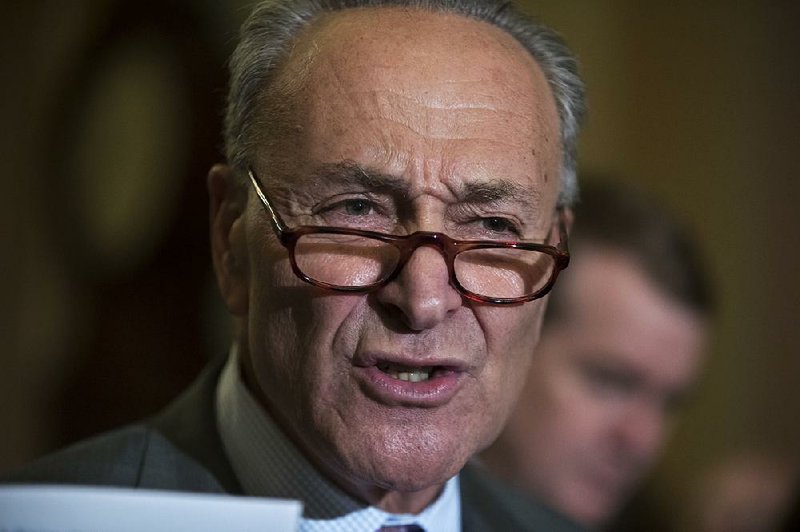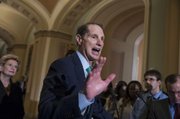WASHINGTON -- After the failure of Republicans to pass health care legislation on their own, Senate Democrats are seizing the chance to influence the potential overhaul of the tax code by calling on Republican leaders to work with them on a plan.
On Tuesday, 45 Senate Democrats sent a letter to President Donald Trump; to Mitch McConnell, the Senate majority leader; and to Sen. Orrin Hatch, the Republican chairman of the Senate Finance Committee, urging them to embrace a bipartisan approach on the effort.
The Democrats reached out days after Republicans failed to repeal the Patient Protection and Affordable Care Act. Members of both parties have said they are thinking about the Republicans' ability to press ahead with their agenda while acting along strict partisan lines.
"We are confident that, by working together, we could modernize our tax system to increase working families' wages, improve middle-class job growth, promote domestic investment, modernize our outdated business and international tax system and put in place sound fiscal policy," the group wrote.
Sen. Charles Schumer of New York, the Senate minority leader, and Sen. Ron Wyden of Oregon, the ranking Democrat on the Senate Finance Committee, organized the drafting of the letter, which lays out their priorities. Three Democratic senators who are up for re-election next year -- Joe Donnelly of Indiana, Joe Manchin of West Virginia and Heidi Heitkamp of North Dakota -- did not sign the letter.
Despite the Democrats' overture, the parties have starkly different ideas on how to change the tax code.
The Democrats are insisting that changes to tax laws not increase the tax burden on the middle class and that the wealthiest 1 percent of taxpayers not see their tax bills shrink.
They also are insisting that Republicans return to "regular order" and not attempt to push a tax bill through Congress using budget-reconciliation rules that require only a simple majority in the Senate.
Finally, they want a rewrite of the tax code that does not add to the deficit and that is not paid for with cuts to programs such as Medicare, Medicaid and Social Security.
Analyses of Republican tax plans have found that the changes the party has proposed would disproportionately benefit high-earners. Thus far, Republicans remain committed to using reconciliation in hopes of getting legislation to Trump's desk before the end of the year.
"We will need to use reconciliation because we have been informed by the majority of the Democrats in a letter I just received today that most of the principles that would get the country growing again, they're not interested in addressing," McConnell said, leaving the option for Democrats to support a Republican-led tax plan. "So I don't think this is going to be 1986 when you had a bipartisan effort to scrub the code."
After the Trump administration and the top Republican tax negotiators in Congress released a set of common tax principles last week, Democrats warned that they were going down the wrong path.
"We need sustainable, comprehensive tax reform, not a massive tax cut for the wealthy," Wyden said.
The White House in April issued a one-page outline for how it wanted to rework the tax code. That plan included cutting the corporate tax rate from 35 percent to 15 percent, simplifying the taxes individuals and families pay, eliminating the estate tax and jettisoning the alternative-minimum tax. White House officials called for cutting many unspecified deductions, but there has been fierce resistance to this from many outside groups.
Democrats are skeptical of the elements of the White House plan, citing the lack of detail and fears that the proposals would lead to huge reductions in federal revenue. Outside budget groups have speculated that Trump's ideas would reduce revenue by $5 trillion over 10 years, leading to a major expansion of the federal debt.
Many Republicans have also questioned whether it is possible to make good on Trump's promises. Hatch, R-Utah, the Senate Finance Committee chairman, in particular has all but dismissed the possibility of reaching Trump's goal to slash the corporate tax rate.
"It would be kind of miraculous if we could get it down to 25 percent or less," Hatch said in a recent interview with Reuters. "I think the odds are, we're going to be lucky to get it down at all."
As Republicans stumble with their legislative agenda, Democrats have been working to revamp theirs ahead of the 2018 midterm elections.
Last week, congressional Democrats introduced an economic program called "A Better Deal" in hopes of stealing some of Trump's populist luster. The plan includes raising the minimum wage and reducing drug prices.
GOP outreach
Republicans have said they are open to a bipartisan tax plan, but most of their discussions on changes to the code have been among themselves.
Antonia Ferrier, a spokesman for McConnell, noted that in the statement Republican leaders released last week, they invited Democrats to get involved.
"It bears repeating to our friends on the other side of the aisle that the Finance Committee is leading the way on reforming America's outdated tax code," Ferrier said.
The Trump administration has also been more vocal this week about the importance of attracting some Democrats to work on a tax plan.
At a gathering Monday of conservative activists sponsored by Americans for Prosperity, the political network of the Koch brothers, Marc Short, the White House legislative affairs director, made the case that Democrats need to be brought into the fold. The Republican majority in the Senate, he said, was too slim for party members to count only on one another.
"We ask your help, actually, reaching out to Democrats as well," Short said, noting the ones who are coming up for re-election. "If they hear from their constituents that they need tax reform, that's going to be a very strong selling point."
He noted that Democrats are facing tough re-election bids in states such as Montana, North Dakota, Ohio and Indiana. "We're confident right now that we will be able to earn their support with our tax reform agenda," he said.
The White House hopes that Congress will be ready for a House vote in October, followed by votes on a similar Senate bill in November.
"So that, I think, is an aggressive schedule, but that is our timetable," Short said. He added that the president plans to do more traveling to pitch a tax overhaul than he did for the health care effort.
National Economic Council Director Gary Cohn repeated the timetable goals at the gathering of conservatives, saying the administration and congressional lawmakers were in a "heavy drive toward tax reform."
Treasury Secretary Steve Mnuchin said at the event that the plan was to have a tax bill "start going through the normal process" beginning Sept. 1.
Debt ceiling looms
Separately Tuesday, talks between the White House and the Senate's top Republican and Democrat broke up Tuesday with no progress on raising the country's debt ceiling, an impasse that threatens a financial crisis if left unresolved.
The Senate and House have 12 joint working days before Sept. 29, when the Treasury Department says it would no longer be able to pay all of the government's bills unless Congress acts. A default would likely disrupt the world financial system, with a stock market crash and surging interest rates that could send the economy into a recession.
Mnuchin has urged Congress for months to raise the debt limit, but the White House has lacked a unified message and run into resistance on Capitol Hill.
Mnuchin met Tuesday morning with McConnell and Schumer, searching for ways to raise the debt ceiling, but the gathering ended without any progress -- or even a clear sense of what the lawmakers needed to deliver votes to raise the limit.
The White House had implored Congress to raise the debt ceiling before the August recess, but lawmakers showed little sign of engaging. The House of Representatives has already left town and will not return until after Labor Day.
The U.S. government spends more money than it brings in through revenue, creating an annual deficit. The Treasury Department borrows money to cover that gap by issuing debt, and it has always paid back the bondholders on time. According to one measurement, the government now has close to $20 trillion in debt.
Congress has established a cap on the amount of money the government can borrow, and Mnuchin has told Congress that this cap must be raised by Sept. 29 to ensure that the Treasury can continue paying all of the government's bills.
Information for this article was contributed by Alan Rappeport of The New York Times; by Kelsey Snell and Damian Paletta of The Washington Post; and by Saleha Mohsin, Justin Sink, Bill Allison and Terrence Dopp of Bloomberg News.
A Section on 08/02/2017

